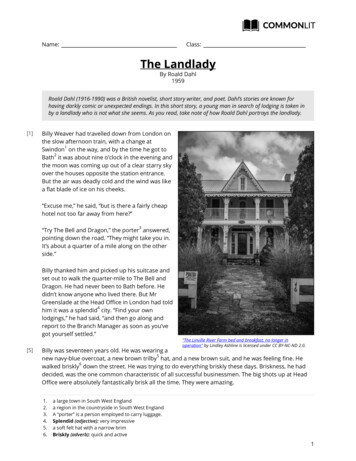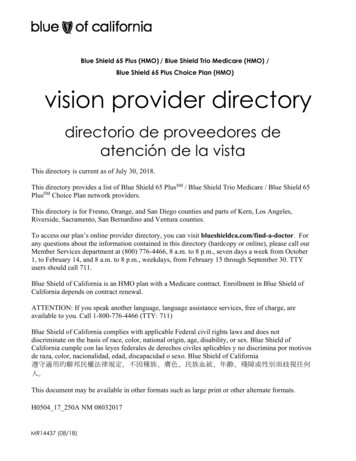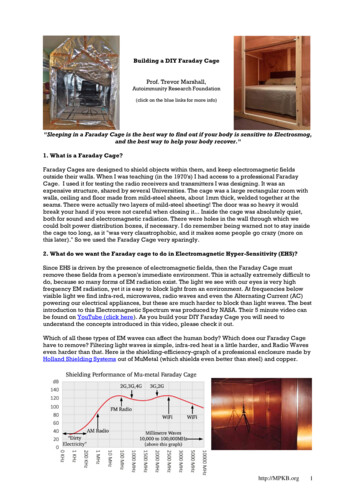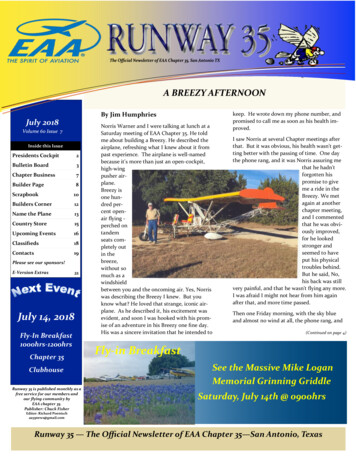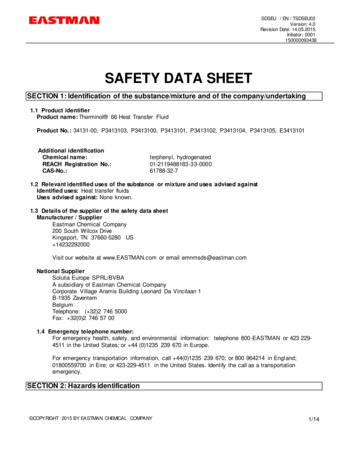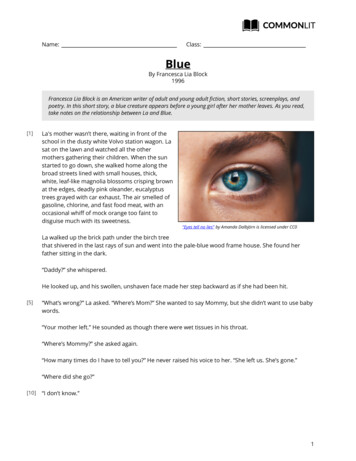
Transcription
Name:Class:BlueBy Francesca Lia Block1996Francesca Lia Block is an American writer of adult and young adult fiction, short stories, screenplays, andpoetry. In this short story, a blue creature appears before a young girl after her mother leaves. As you read,take notes on the relationship between La and Blue.[1]La's mother wasn’t there, waiting in front of theschool in the dusty white Volvo station wagon. Lasat on the lawn and watched all the othermothers gathering their children. When the sunstarted to go down, she walked home along thebroad streets lined with small houses, thick,white, leaf-like magnolia blossoms crisping brownat the edges, deadly pink oleander, eucalyptustrees grayed with car exhaust. The air smelled ofgasoline, chlorine, and fast food meat, with anoccasional whiff of mock orange too faint todisguise much with its sweetness."Eyes tell no lies" by Amanda Dalbjörn is licensed under CC0La walked up the brick path under the birch treethat shivered in the last rays of sun and went into the pale-blue wood frame house. She found herfather sitting in the dark.“Daddy?” she whispered.He looked up, and his swollen, unshaven face made her step backward as if she had been hit.[5]“What’s wrong?” La asked. “Where’s Mom?” She wanted to say Mommy, but she didn’t want to use babywords.“Your mother left.” He sounded as though there were wet tissues in his throat.“Where’s Mommy?” she asked again.“How many times do I have to tell you?” He never raised his voice to her. “She left us. She’s gone.”“Where did she go?”[10]“I don’t know.”1
La took a step toward her father, but the look in his eyes made her back away into her bedroom andshut the door. She sat on her bed and stared at the wall she had helped her mother paint withwildflowers, pale and heathery; now they seemed poisonous. La looked at Emily, H.D., Sylvia, Ann,Christina, and Elizabeth sitting on the love seat. Her mother had named them after her favorite poets.They stared back with blank doll eyes.La wanted to cry, but she couldn’t. She felt like a Tiny Tears doll with no water inside.“La,” said a voice.She jumped and turned around. The closet door was open a crack. La never left the closet door open.She was afraid that demons would come out and get her in the night.[15]“La,” the voice whispered.She held her breath.The closet door opened a little more, and a tiny shadow tiptoed out.Maybe, she thought later, Blue was really her tears. Maybe Blue was the tears that didn’t come.The creature came into the light. It had thin, pale, slightly bluish skin. It blinked at La with blue eyesunder glittery eyelashes.[20]“Who are you?” La felt a slice of fear. “Why are you here?”“For you.”La rubbed her eyes. “Are you a demon?”The creature looked about to cry. La shook her head, trying to make it go away.“Now you should sleep, I think,” and the creature reached out its tiny blue fingers with the bitten nailsand touched La’s forehead.[25]Almost immediately La was asleep.She dreamed about the creature holding her mother’s hand and running through a field of wildflowers.“Blue,” La’s mother said in the dream. “Your name is Blue.”***2
The house where La lived looked completely different now. When La’s mother was living there, thegarden had been wild, but a garden — now the flowers were burnt up; crabgrass stitched the dirt.There had been bread-baking, bowls of fruit, Joni Mitchell singing on the stereo, light coming throughthe windows. Now, the only light in the living room was from the television’s glow. La’s father stoppedwriting the novel he had been working on. Every night after he got home from college, he correctedpapers and watched TV. La’s mother had been a student in his English class, and he had fallen in lovewith her when he read her poetry. Wanting to protect her from a world that seemed too harsh, he had1not understood how she dreamed of living in a commune, dancing barefoot in parks, and reading herpoems, wearing silver Indian bells and gypsy shawls, even though these were the things that haddrawn him to her.La remembered when she was a little girl, how her mother held her close and said, “Can you see thelittle dolls in Mommy’s eyes?” La had seen two tiny Las there. As she got older, she still looked forherself inside her mother. Now she tried to find that La in her father, but his eyes were closed to her,dull and blind.[30]La fixed herself a bowl of cornflakes and went into her room to talk to Blue.“Did you know my mother?” La asked“I can tell you things about her.”“How do you know?” La was suspicious.“I know because I know you.”[35]“Like what?”“She wrote poetry.”La thought about the journals with the stiff, creamy paper and thick, bumpy black covers that hermother hid at the bottom of the closet. La had looked for them after her mother had left, but theywere gone. She had tried to remember some of the poems her mother had read to her from thebooks. She had opened a tiny bottle of French perfume that was sitting on her mother’s marble-topdressing table. As she put a drop to her throat, she remembered something about a girl dancing in agarden while a black swan watched her with hating eyes and one poem about a woman with blackroses tattooed on her body. Something about a blue child calling to a frightened woman from out ofthe mists — begging.“Did she want me?” La asked Blue.“At first she was scared of you. You were so red and noisy, and you needed so much.”[40]La could feel her eyes stinging, but Blue said, “Then she changed her mind. After a while, you were allshe really cared about.”“Then why did she leave?”1.a place where a group of people live together and share possessions and responsibilities3
Blue went and perched on the window sill. “That I don’t know.”***One day at lunch, Chelsea Fox came and sat next to La. Chelsea had a shiny lemonade-colored hair tiedup high in a ponytail, and she was wearing pink lip gloss that smelled like bubble gum. La thought shewas the most beautiful girl she had ever seen. She made you want to give her things.“Don’t you have any friends?” Chelsea demanded.[45]La shrugged.“Why not?”La said, “I like to play by myself.”“I used to be that way,” Chelsea said. “I started talking when I was real little, and the other kids didn’tunderstand what I was saying. They just sat in the sandbox and stared at me. So I made up animaginary friend I talked to. But my mother told me it wasn’t healthy.”“I do have one friend.” La had been wanting to talk about Blue so much. And now Chelsea Fox wasasking! La’s heart started to pound against her. She felt as if she were made of something thin andbreakable, with this one heavy thing inside of her. “Blue is blue and lives in my closet.”[50]Chelsea laughed, all tiny teeth like mean pearls. “You still have an imaginary friend?”“Blue is real.”Chelsea made a face at La, flipped her hair, picked up her metal Barbie lunch box, and walked away. Lacrushed her brown paper bag with her fist on the table where she sat alone now. Milk from the smallcarton inside the bag seeped onto the peeling, scratched table and dripped down.After that, no one talked to La at all. Chelsea Fox had a birthday party. La saw the invitations with theballerinas on them. She waited and waited. But she was the only girl who didn’t get one.When Miss Rose found out, she asked La and Chelsea to stay after school. Miss Rose was a very thin,freckled, red-haired woman who always wore shades of green or pink.[55]“Chelsea, don’t you think you think you should invite La to your birthday party?” Miss Rose said.La looked down to hide her red face. She remembered what Blue had told her about how red she hadbeen as a baby, how it had frightened her mother.Chelsea shrugged.“Go ahead, Chelsea, ask La. It isn’t nice to leave her out.”4
Chelsea smiled so her small white teeth showed. They reminded La’s of a doll’s. “La, would you like tocome to my party?”[60]La was afraid to look up or move. She hated Miss Rose then.“She doesn’t want to,” Chelsea said.“I think she does,” said Miss Rose. “Don’t you, La?”“Okay,” La whispered, wanting her teacher to shut up.“Why don’t you bring an invitation in tomorrow?” Miss Rose said.[65]“Just don’t bring any imaginary friends,” Chelsea hissed when they were dismissed onto the burningasphalt. La imagined Chelsea spitting her teeth out like weapons. The air smelled grimy and hot like thepink rubber handballs.La walked past some boys playing volleyball. The insides of her wrists were chafed from trying to serveat recess; her knees were scraped from falling down in softball; her knuckles raw from jacks.Sometimes her knees and knuckles were embedded with bits of gravel, speckled with blood. She hadmosquito bites on her back.“There goes Wacko,” one of the boys shouted.La felt chafed, scraped, raw, and bitten inside too.***La wasn’t planning to go to Chelsea Fox’s birthday party, but she saved the invitation anyway. La’sfather saw it. He hardly spoke to his daughter anymore, but that morning, he said, “Is that a partyinvitation?”[70]La nodded.“Good,” said her father. “It’s about time you did something like that.”La went mostly because her father had seemed interested in her again and she wanted to please him— she wanted him to see her. But the next weekend, when he drove her to Chelsea’s tall house withthe bright lawn, camellia-and-rose-filled garden, the balloons tied to the mailbox, and the powder-blueMercedes in the driveway, he was as far away as ever.Maybe it is better that he doesn’t offer to walk me in, she thought. I don’t want them to see himanyway.She wanted to go home and play with Blue, but instead, she jumped out of the car and went up to thedoor where a group of girls waited with their mothers.5
[75]Chelsea answered, wearing a pastel jeans outfit. The girls kissed her cheek and gave her presents.When it was La’s turn, she gulped and brushed her lips against Chelsea’s face. Chelsea reached up toher cheek and rubbed away the kiss with the back of her hand.Inside, the house was decorated in floral fabrics — huge peonies and chrysanthemums — and lit upwith what seemed like hundreds of lamps. Little pastel girls were running around screaming. Therewas one room all made of glass and filled with plants and leafy, white iron furniture. In the middle wasa long table heaped with presents. La sat in a corner of the room by herself. After a while, Chelsea’smother came in, leading a chorus of “Happy Birthday” and holding a huge cake covered in wet-lookingpink-frosting roses. Chelsea’s mother had a face like a model on a magazine cover — cat eyes, highcheekbones, and full pouting lips. She was tall and slender, her blonde hair piled on top of her head,with little wisps brushing down against her long pearled neck. La watched Chelsea blow out elevencandles in one breath.“I’ll get my wish!”She probably did get her wish, La thought, watching Chelsea’s small hands tearing open the presents— Barbies, Barbie clothes, Barbie cars, stuffed toys, roller skates, jeans, T-shirts, a glittery magenta bike2with a white lattice basket covered with pink plastic flowers.La had brought the almost-empty bottle of perfume that had belonged to her mother. Even though thefragrance inside it was the only thing that seemed to bring La’s mother back, La had decided to give itto Chelsea. Maybe it would make Chelsea like her, La thought. It was her greatest treasure.[80]When Chelsea opened it, she said, “What’s this? It’s been used!” and threw it aside.Chelsea’s mother let the girls stay up until midnight, and then she told them to get their sleeping bags.La’s belonged to her father — blue with red flannel ducks on the inside. The other girls had pastelsleeping bags with Snoopy or Barbie on them. La put her bag down in a corner and listened to thesugar-wild giggles all around her.Suddenly, she heard Chelsea say, “La, tell us about your imaginary friend. La has an imaginary friend.”“She gave you an imaginary present,” Amanda Warner said.Snickers. They sounded mean with too much cake. La was silent.[85]“Come on.” The girls squealed. “Tell us.”La said, “No, I don’t.”“Your mom left because you are so weird,” said Katie Dell.“I think her mom was pretty weird too. She was a hippy,” said Chelsea.La buried down in the musty red flannel of her sleeping bag.2.an interlaced structure6
[90]Blue, she thought, to keep herself from crying.Near morning, when the other girls were finally quiet, warm thin arms the color of Chelsea Fox’s eyeswrapped around La’s waist.“Write about it,” Blue whispered. “Write it all.”That was the same thing Miss Rose said the next day in class. “I want us all to write about someone welove.” She looked straight at La. She noticed for the first time how sad Miss Rose’s brown eyes were.La went home and shut the door of her room. She lay down on her belly on the floor, with a pen and apiece of paper. There was a creaking sound, and the closet door opened. Blue came out.[95]“What are you doing?”“I’m supposed to write about someone I love. I want to write about my mom, but I’m afraid.”Blue began to whisper things in La’s ear. She picked up her pen and wrote.***La wrote how she had been named La for the musical sound and also for the city they lived in — notfor the dry, flat, chain-linked-fenced, train-track-lined, used-car-lot-full valley where their house was,but for the city over the hill. La’s mother — wearing a paisley dress, her long hair hanging to her waist— took La to eat honey-colored cornbread at a restaurant with a mural of an Indian temple on theoutdoor courtyard wall and soft candle cubes flickering like chants on every table. She took La to themuseum where they saw jewelry in the shapes of fairies with stained-glass wings; to a temple in thehills full of gentle-faced Buddha statues and people planting trees, the air almost lavender with cloudsof incense. They walked around the lake tucked into the Hollywood hills, feeling the cool, wet air ontheir cheeks, looking out at the expanse of water and the small, magical bridge lined with white globes;La imagined a princess receiving her guests there. They rode wooden horses on the carousel at thepier, feeling the smooth, wooden horse flanks, caressing the ridges of wooden roses on the saddles,watching the circle of lights that seemed to make the tinkling music. On dusty trails, they rode realhorses, and La’s mother pointed out the wildflowers peeking at them from behind the rocks. Whenthey got home, they zigzagged handfuls of wildflower seeds into the earth — primrose, columbine,lupine, and cornflower. They painted wildflowers on the walls of La’s room — “So you will always havethem,” her mother said.La wrote about her mother coming into her room at night sometimes, to read La poetry by Emily andH.D. in the pinkish light, the words like her mother’s perfume wafting around them. Sometimes, La’smother read her own poems. La felt the secret of sadness bonding them together then.[100] “I will love you forever,” La’s mother had said. “No matter where I am on the planet, I am always lovingyou.”La wrote about all of that and about the perfume bottle shaped like a teardrop that had brought hermother back.7
***“This is wonderful, La,” Miss Rose said. “Would you like to read it to the class?”La shook her head, cringing, pressing her back against hard wood and metal.“I really think you should,” said Miss Rose.[105] Chelsea Fox said, “I’d love to hear your story.” She said it so sweetly that for a moment La believed her.But then she saw Chelsea glance over at Amanda Warner, and a silent laugh swelled the air betweenthem.“Go ahead,” Miss Rose said.La couldn’t breathe. She felt like throwing up.But when she started to read, something happened.She forgot about Chelsea Fox, Amanda Warner, and everyone else in the class. The words La and Bluehad written cast their spell — even over La. She could smell the perfume and bittersweet wildflowers;she could hear Joni Mitchell’s For the Roses playing softly.[110] When La was finished, she looked up. Everyone was silent, watching her.“That was beautiful,” Miss Rose finally said.The bell rang and everyone scattered. La went into the fluorescent-lit, brown and beigy-pink hallway.Her heart was beating fast but in a different way this time. She felt as if she had physically touchedeveryone in the room, as if she had played her favorite song for Miss Rose and lifted an open, tearshaped bottle of fragrance to Chelsea Fox’s face.“Your mom sounds like she was cool,” Chelsea said, catching up with La. “My mom isn’t like that. Shedoesn’t spend time with me except to go shopping and stuff.” La looked into Chelsea’s blue eyes. Thepupils were big and dark. There was no laughter in them now. La nodded.Chelsea tossed her hair and ran to catch up with her friends.[115] When La got home, she ran inside to tell Blue. Her father wasn’t on the couch watching TV where Laexpected him. She heard his typewriter keys and peeked into his office. The windows were open andVivaldi was playing; he had a cup of coffee at his fingertips.“Daddy,” La said.When she handed him the story, his eyes changed.“It’s about Mom,” La said, but she knew he knew.8
“I’m writing something about her too,” he said. He held out his hand and she went to him. He sat upand kissed her forehead.[120] “Thank you, honey.” He looked as though he hadn’t slept or eaten for days. But he took off his glassesthen, and La saw two small images of herself swimming in the tears in his eyes.La went to her room to tell Blue. In the closet, there were only clothes and shoes and shadows now.WHEN I WAS YOUR AGE, VOLUME 1. Text of “Blue” copyright (c) 1996 by Francesca Lia Block. Reproduced by permission of the publisher,Candlewick Press, Somerville, MA.9
Text-Dependent QuestionsDirections: For the following questions, choose the best answer or respond in complete sentences.1.PART A: Which statement best expresses a theme of the short story?A.B.C.D.2.PART B: Which detail from the text best supports the answer to Part A?A.B.C.D.3.“The creature came into the light. It had thin, pale, slightly bluish skin. It blinkedat La with blue eyes under glittery eyelashes.” (Paragraph 19)“‘I do have one friend.’ La had been wanting to talk about Blue so much. Andnow Chelsea Fox was asking!” (Paragraph 49)“‘I will love you forever,’ La’s mother had said. ‘No matter where I am on theplanet, I am always loving you.’” (Paragraph 100)“She felt as if she had physically touched everyone in the room, as if she hadplayed her favorite song for Miss Rose and lifted an open, tear-shaped bottle offragrance to Chelsea Fox’s face.” (Paragraph 112)PART A: How is La affected by her mother’s leaving?A.B.C.D.4.Children often have unrealistic expectations about their parents and view themas perfect.Sharing one’s feelings through writing can help one overcome emotional stressand connect with others.Young people sometimes reject their unique talents because they make themfeel different.During times of stress or sadness, people sometimes experience hallucinationsand a break from reality.She questions her importance to other people.She becomes distrustful of the people she counts on.She struggles to process her mother’s sudden abandonment.She feels a greater sense of connection with her mother.PART B: Which quote from the text best supports the answer to Part A?A.B.C.D.“La took a step toward her father, but the look in his eyes made her back awayinto her bedroom and shut the door.” (Paragraph 11)“‘Then why did she leave?’ / Blue went and perched on the window sill. ‘That Idon’t know.’” (Paragraphs 41-42)“La wrote about all of that and about the perfume bottle shaped like a teardropthat had brought her mother back.” (Paragraph 101)“She could smell the perfume and bittersweet wildflowers; she could hear JoniMitchell’s ‘For the Roses’ playing softly.” (Paragraph 109)10
5.How does the resolution of the short story develop the theme? Cite evidence from the textin your response.11
Discussion QuestionsDirections: Brainstorm your ans
La never left the closet door open. She was afraid that demons would come out and get her in the night. “La,” the voice whispered. She held her breath. The closet door opened a little more, and a tiny shadow tiptoed out. Maybe, she thought later, Blue was really her tears. Maybe Blue was the tears that

